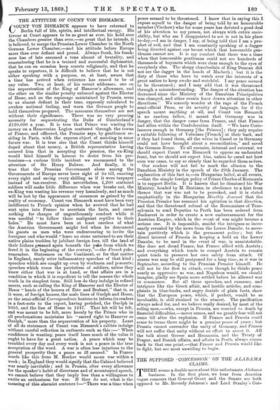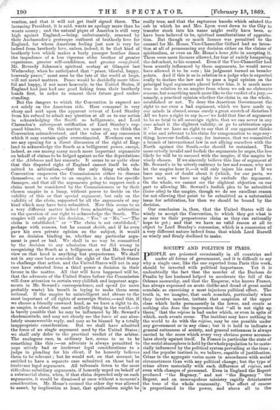THE SUPPOSED 'CONCESSION' ON THE ALABAMA CLAIMS.
rilHERE seems a double mess about this unfortunate A labanta business. In the first place, we hear from America vague rumours that General Grant and the Senate are both opposed to Mr. Reverdy Johnson's and Lord Stanley's Con-. vention, and that it will not get itself signed there. The incoming President, it is said, wants an apology more than he wants money ; and the natural pique of America is still very high against England,—being, unfortunately, renewed by their Ambassador's grotesque outburst of brotherly love for England, for whom American feeling just now is very far indeed from brotherly love, unless, indeed, it be that kind of brotherly love which makes a burly younger brother damn the impudence of a less vigorous elder brother of greater experience, greater self-confidence, and greater sang-froid. Mr. Reverdy Johnson's spiritual ecstasy at Glasgow last Wednesday, when he anticipated that "peace, blissful, happy, heavenly peace," must soon be the fate of the world at large, will not mend matters. Peace would be decidedly more blissful and happy, if not more heavenly, to the United States, if England had just had one good licking from their brotherly hands first, in order to cement their future good understanding.
But the dangers to which the Convention is exposed are not solely on the American side. Here comment' is very sharp and acid upon the apparent retreat of Lord Stanley from his refusal to admit any question at all as to our action in acknowledging the South as belligerents, and Lord Clarendon's subsequent ratification of Lord Stanley's supposed blunder. On this matter, we must say, we think the Convention misunderstood, and the value of any concession which it may contain quite overestimated. Nowhere can we see any opening for a direct discussion of the right of England to acknowledge the South as a belligerent power, except, indeed, as one among many much more important arguments on behalf of claims to be lodged against us for the depredations of the Alabama and her consorts. It seems to us quite clear that this disputed right of England cannot itself be submitted to arbitration,—that the only thing which the Convention empowers the Commissioners either to discuss themselves, or to refer to an umpire, is a claim for specific damages, and that all the arguments going to support such a claim must be considered by the Commissioners or by their chosen umpire in a lump, without power to decide on the validity of this or that special argument, but only on the validity of the claim, supported by all the arguments of any kind which may have been submitted. Now this seems to us a very different matter indeed from admitting arbitration on the question of our right to acknowledge the South. The umpire will only give his decision, " Yes " or "No,"—" The claim is established," or "The claim is not established," perhaps with reasons, but he cannot decide, and if he even gave his own private opinion on the subject, it would be no decision binding us, whether any particular argument is good or bad. We shall in no way be committed by the decision to any admission that we did wrong in recognizing the South as a belligerent, or that Mr. Seward's view on that head is anything but preposterous. We shall not in any case have conceded the right of the United States to challenge that action, and the United States will not in any case have extorted from a third power a decision in their favour in the matter. All that will have happened will be, that the advocate of the United States before the Commission will draw attention to certain very childish and impotent arguments in Mr. Seward's correspondence, and spend (or more probably waste) his breath in trying to make them seem rational. If the umpire be unintelligent and obtuse to the most important of all rights of sovereign States—and this, if we choose a friendly crowned head, as we have a right to do, as umpire, is about the most unlikely thing in the world,—it is barely possible that he may be influenced by Mr. Seward's rhodomontade, and may not clearly see the force of our absolutely unanswerable reply, and may so be biassed by a totally inappropriate consideration. But we shall have admitted the force of no single argument used by the United States ; we shall only defer to the practical verdict of the arbiter. The analogous case, in ordinary law, seems to us to be something like this :—an advocate is always permitted to urge utterly bad or irrelevant legal considerations to a judge in pleading for his client, if he honestly believes them to he relevant ; but he would not, on that account, be entitled to have a separate case submitted on those bad or irrelevant legal arguments. All tribunals listen to the most ridiculous subsidiary arguments, if honestly urged on behalf of a substantial claim, when, if that claim depended only on such arguments, it would be dismissed at once without a moment's consideration. Mr. Home's counsel the other day was allowed to assert, by implication at least, that spiritualism might be really true, and that the rapturous knocks which saluted the cab in which he and Mrs. Lyon went down to the City to. transfer stock into his name might really have been, or have been believed to be, spiritual manifestations of approbation. But though so much licence was permitted to the counsel for Mr. Home, Vice-Chancellor Giffard had no intention at all of pronouncing any decision either on the claims of spiritualism, or even on Mr. Home's bona fides in accepting it. These were mere licences allowed, for fear of rudely hampering the defendant, to his counsel. Even if the Vice-Chancellor had been secretly influenced by these arguments, he would never have allowed it to be seen ; his judgment turned on broader points. And if this is so in relation to a judge who is expected really to declare the law and to pass a legal opinion on the principal legal arguments placed before him, it is much more true in relation to an umpire from whom we ask no elaborate reasons, but something much more like to the verdict of a jury,—. namely, a practical opinion whether the claim is, on the whole, established or not. To deny the American Government the right to use even a bad argument, which we have made up our minds is absurd, seems surely a great stretch of dictation All we have a right to say is,—' we hold that line of argument to be so fatal to all sovereign rights, that we can never in any case admit it the slightest validity, or go to arbitration upon it.' But we have no right to say that if our opponent thinks it wise and relevant to his claim for compensation to urge anything, however foolish,—say, for instance, that we committed a breach of international law in not allying ourselves with the North against the South,—he should be restrained. The more utterly invalid and foolish the arguments he urges, the less. likely he will be to succeed with the umpire, if the umpire be wisely chosen. If we sincerely believe this line of argument of Mr. Seward's to be utterly contrary to law and reason, why not let the umpire hear it,—it will only injure his case If we have any sort of doubt about it (which, for our parts, we have not), we have no right to exclude the argument.. On the whole, we cannot see the slightest objection on our part to allowing Mr. Seward's foolish plea to be submitted (inter alia) to the umpire, though we do see excellent reason for not allowing that point to be submitted as a substantial issue for arbitration, for then we should be bound by the decision.
Our conclusion is, then, that the United States will do, wisely to accept the Convention, in which they get what is as near to their preposterous claim as they can rationally hope to get ; and that we have no valid reason at all to object to Lord Stanley's concession, which is a concession of a very different nature indeed from that which Lord Russell so wisely and firmly declined to make.































 Previous page
Previous page